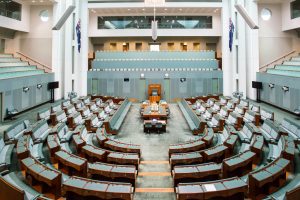Sean Turnell, an Australian economist who spent almost two years imprisoned in Myanmar, received a hero’s welcome Thursday at Australia’s Parliament House where lawmakers rose in a standing ovation and the prime minister praised his courage, optimism and resilience.
Turnell, an adviser to Myanmar’s elected leader Aung San Suu Kyi, was among American, Japanese, and British citizens released on November 17 as part of a broader prisoner amnesty during Myanmar’s National Victory Day celebrations.
Days after Myanmar’s military seized control of the Southeast Asian country in February 2021, Turnell was arrested while preparing to leave the country. He was sentenced in September to three years in prison on charges of violating the country’s official secrets law and immigration law.
The 58-year-old Sydney resident and his wife Ha Vu sat in the House of Representatives on Thursday on Parliament’s final sitting day of the year as lawmakers stood to applaud the couple.
“We are so glad as you’ve seen from the response across the chamber here to have you back,” Prime Minister Anthony Albanese told the couple.
Albanese said the military had “trashed human rights” in Myanmar, where Turnell has worked intermittently over 30 years. He thanked the Association of Southeast Asian Nations and Japan for helping Australia’s diplomatic efforts to secure Turnell’s release.
“What he endured in his 650 days of incarceration is something that no human being should have to endure and yet he has done it with grace and even in inhumane conditions with profound humanity,” Albanese told Parliament.
Talking directly to Turnell, Albanese added, “Our relief and joy at your release is also tinged with no small amount of awe, awe and respect at your courage, your optimism and your resilience.”
Turnell did not speak to Parliament. But he described his ordeal and his joy at being reunited with his family in an interview with the Australian Broadcasting Corp.
An interrogator had told him he would never see his wife or child again.
Turnell said he had initially been held in isolation in a room he called “the box,” which was like a windowless shipping container with a concrete floor.
He was later moved to Insein prison in Yangon, Myanmar’s largest city. Later, he was transferred to the capital, Naypyidaw, where he was held near a hut where Aung San Suu Kyi was imprisoned. They spoke weekly. “The very first thing she said, she said, ‘Sean I am sorry to you, to Ha, your dad, and your whole family for involving you in our problems,'” Turnell said.
Insein Prison was the end of his solitary confinement but was “completely open to the elements.”
“Open to the elements in Yangon means monsoon, it means incredible heat, it means insects, rats, these horrible big scorpions that come into the cell,” Turnell said.
“The upside, of course, was that I was with people, with other political prisoners. I’ll never forget the moment when a very young political prisoner came up to me and said, ‘Sean, you’re safe now. You’re with us,” Turnell added.
“But I do remember having the feeling, ‘well, yeah, I’m with you, but we’re all in here,'” Turnell laughed.

































